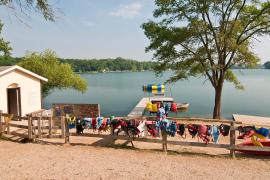"If you're a Sheriff's Deputy working out in rural areas, what opportunities do you have to take a bathroom break? Where can you warm up your lunch? Or grab a cup of coffee?"
Back when she was a camp director, Redwoods' consultant Meredith Stewart was thinking a lot about the folks who would come to her aid in the event of an emergency. Rather than just asking them for something — like touring her facilities, or reviewing her emergency action plan — she instead started out asking something that should be relationship building 101:
"I asked myself a simple question. 'What do they need from me?' By doing that, I was able to put myself in their shoes, and to think a little more deeply about what an authentic, mutually beneficial relationship might look like. I want them to be my friend. I want to be able to ask for them by name. And if there is something that our camp can do to support their work, I want them to be able to do the same and reach out to us."
A Gesture of Support
As a result of those reflections, she ended up inviting the sheriff's deputy to camp, and offering up the use of the camp's staff facilities as a resource for when they were out on patrol. From use of the staff kitchen, bathroom, air conditioning, or just a place to stop and stretch, there are often a variety of facilities that can come in useful for someone who is essentially working out of their car.
By making that offer, Meredith says she wasn't simply being transactional, or trying to win favor. Instead, she was aiming to foster mutual understanding, create familiarity with the facilities and camp culture, and to also build trust:
"It's easy to think about this type of relationship building as being simply a case of 'you scratch my back and I'll scratch yours,' but I think it goes deeper than that. It's really about getting to know each other, so that you can support each other when it's most needed. When we had an incident that needed de-escalation beyond the ability of our staff, for example, we didn't want to call the Sheriff in and have them arrive with sirens blaring in the middle of camp, or with handcuffs at the ready. We wanted them to understand the need for de-escalation. But it is way easier to have that conversation in advance, over a cup of hot coffee, than it is to have it in the moment when the crisis is in full swing."
Strengthening Community Connections
Of course, the sheriff's department isn't the only emergency service that a camp will need to build relationships. EMTs, search and rescue teams, and fire departments are also a high priority, especially as the risk of wildfire gets more commonplace. That's why Meredith would have the fire department out for a picnic regularly, and why other camps will sometimes host fire departments at their facilities for training exercises — or letting them know that they can draw water from their retention ponds when needed.
It's important to note, however, that providing access to your facilities does not mean giving people free range. While emergency services do important and sometimes heroic work, it's important to still keep an eye safety and abuse prevention. And that, says Meredith, is really about being consistent with your protocols:
"If it's camp policy that everyone checks in at the front desk, then you'll want to follow that procedure in this case too. If you're allowing folks to come and go when they need to, unannounced, then you'll want to make sure that they know specifically which areas they are welcome to use, and which are reserved for campers and staff. The good news is that emergency services tend to naturally understand safety. And they will likely be relieved to see you following protocols to keep everybody safe."
Stay Flexible. Ask Questions.
Exactly how your camp builds relationships with emergency services will depend on the demographics of the campers you serve, your location, the resources you have available, and on the needs and policies of the services you are reaching out to. The trick is to remain flexible, and to start by asking, genuinely and authentically, 'what do you need from us, and how can we help each other out?'
The ultimate goal, says Meredith, is to make sure that the camp is embedded in the fabric of the community around you. Because community comes into its own when emergencies arise.
This blog was provided by The Redwoods Group.
Periodically, the American Camp Association (ACA) makes timely and relevant information about products and services available to its members so they can make informed decisions for their camps. However, the ACA does not endorse products, services, or companies.
The views and opinions expressed by contributors are their own and do not necessarily reflect the views of the American Camp Association or ACA employees.




